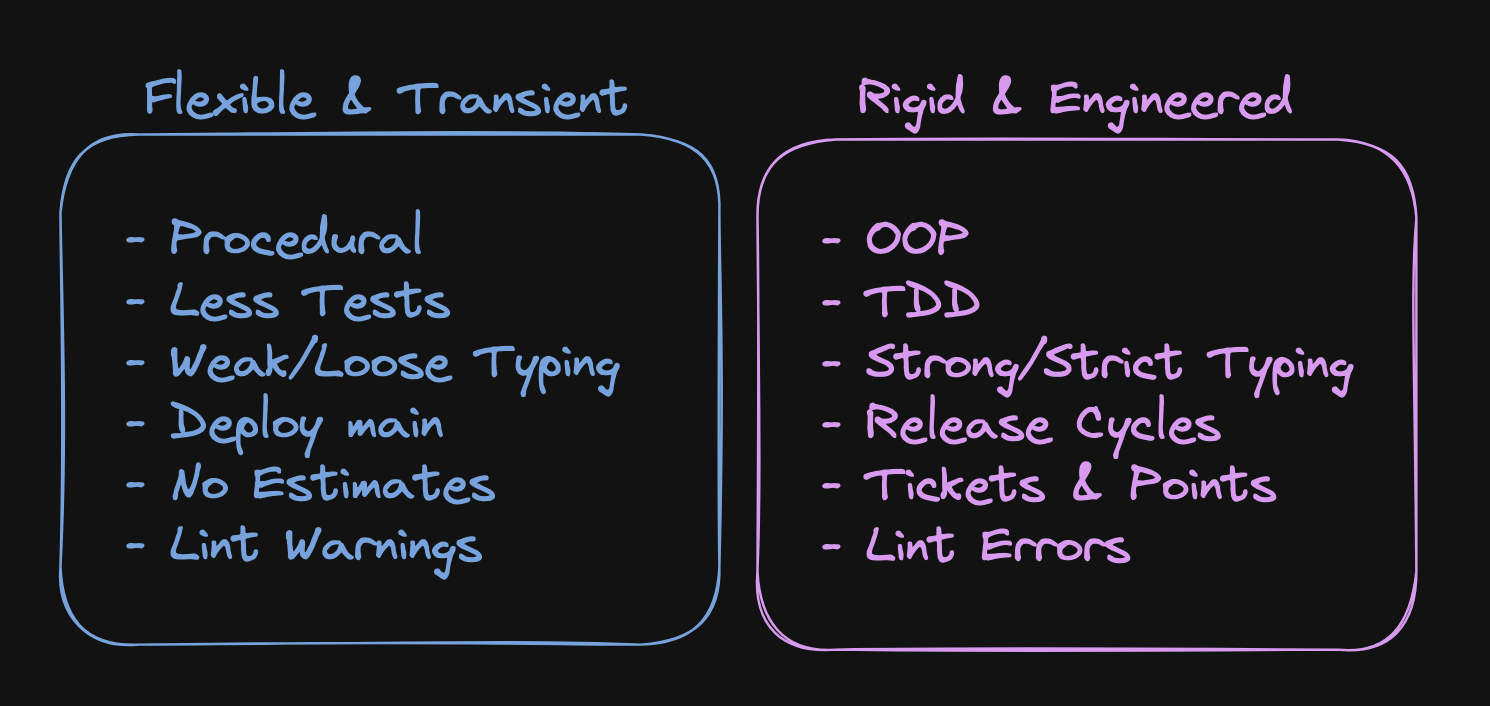Single-Developer vs Fortune 500 Software Engineer
Published 02-08-2023
I currently work at the Fortune 500 tech company Cisco. While I work here, I also work on one extensive side project in my free-time. — I noticed what worked for me in a team at my full-time job, did not hold up for what worked best for me in my side project.
Software development is filled with methodologies, best practices, and advice. Often, what works for a developer working by themself, a small team, and a large company; may vary significantly.
These practices can also vary by domain or type of project. We’ll focus on differences introduced by size & complexity.
- For example, the degree of automated testing needed for writing a SQL Database Engine may be more significant, regardless of size.
Thus, an alternate title may be, working on side projects vs working on company projects.
Clarification: By single-developer. I mean the sole developer working on a project without other programmers, designers, product, etc… Not contractors / freelances hired independently, that then may work in a team.
Single-Developer vs Enterprise
Enterprise Workflow
Things I use daily at a large company in a medium sized team. All of which are patterns set by architects & followed by engineers like me:
- OOP and Redux-like patterns
- Mandatory Code Coverage
- Significant Unit/E2E/Integration Testing
- Pull Requests and Mandatory Reviewers
- Large number of modular libraries in a Monorepo
- Angular (A frontend framework, ideal for enterprise-level development)
- Numerous lint rules, sonar, and pre-commit hooks
- Release branches / Cherry-picking
- Extensive Design Mock-ups
- Jira & Agile
By contrast. I use almost none (or very little) of these methodologies in my side projects.

Single-Developer Workflow
In my side projects I strongly prefer:
- Procedural programming
- No mandatory coverage
- Only testing critical paths if automating
- No Pull Request Approvals
- Projects are broke out by App & Shared
- Svelte-Kit, Astro, & Tailwind
- No error lint rules, sonar, or commit hooks
- Feature deployments, but no cherry picking.
- No External Designs or Mock-ups
- No Jira or Agile

When working as a single-developer I tend to prefer methodologies that are flexible and transient.
It’s not that flexible & transient is better than rigid & engineered or vice versa. It’s more-so an evaluation of what is the best tool for the job and the developer.
This article will be a primer into further elaborating on these ideas in future articles. For now, here are references and explanations that have shaped my opinions over the years. These have led me to think this way and prefer some of these options over others.
Shaping my Software Opinions
Purple Cow & This is Marketing by Seth Godin
- After reading these books, I realized my app wasn’t designed to succeed, and restarted.
- In 1 month I accrued 5x as many users as my previous app did in 1 year.
Transitional Apps and Rethinking Reactivity by Rich Harris
- Both videos are fantastic. It was exciting to hear about a framework and really resonate with its ideas and values.
Object Oriented Programming is Bad by Brian Will
- You should watch all 3 parts. This has had a huge influence on the way I prefer to code.
Jonathan Blow — Creator of Braid and the Witness
- I started paying more attention to people who made games and worked with graphics. They’re often solving complex problems, quickly, with few people.
- Coincidentally, the best engineer I’ve ever worked with was extremely well versed in graphics and maps.
- I found his first series on Neovim a couple years ago and it completely changed the way I edited. His latest series on Neovim from scratch is pure gold.
- I’ve taken a lot of inspiration from these plugins. This type of software made me realize just how much you can do simply by having: sane defaults, flexible configuration, and good documentation
- My first taste of truly high quality and inspiring tutorials
What the Heck is the Event Loop
- This is one of those videos that I had to watch 3 times. I could watch it again today and still learn something.
- Allen Holub’s recent takes on Twitter can be… uh questionable.
- But I agree with this video (for the most part) and helped me put in to words what I don’t like about Agile.
- I read this in my early 20s. It helped me realize people don’t know what they want. You have to show them options and iterate.
Clean Code by Robert Martin.
- Early in my career I read it front to back and tried to follow it for years. This is what lead me to find the video “Object Oriented Programming is Bad”
- An important stepping stone in my journey, but I don’t agree with many of the teachings in this book.
Hopefully you find some of these useful like I did. Thanks for reading :)